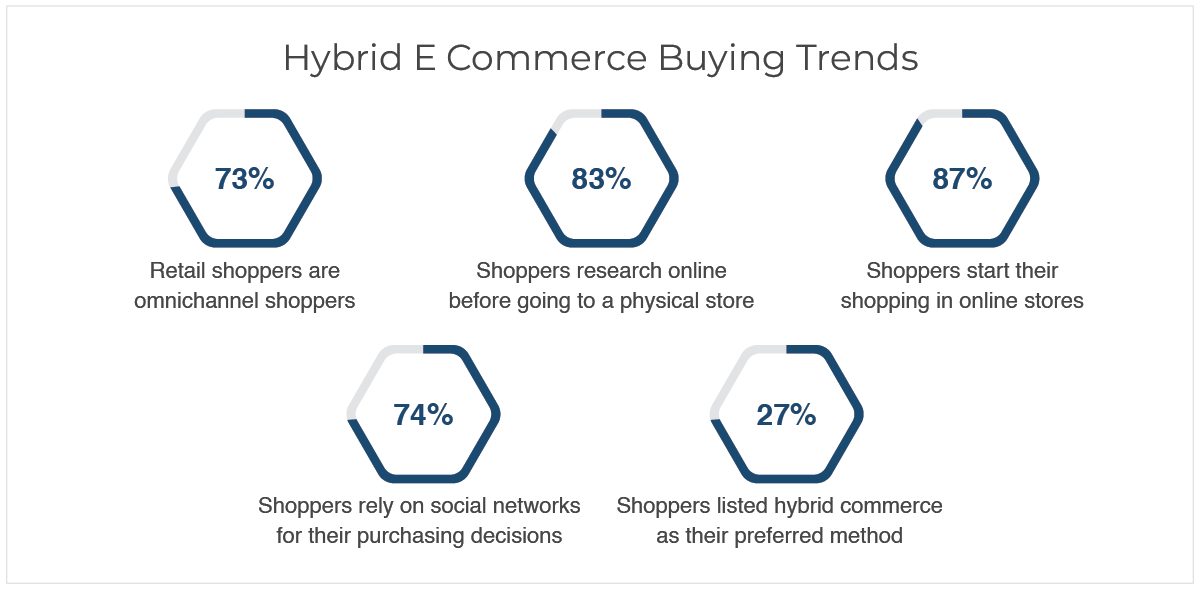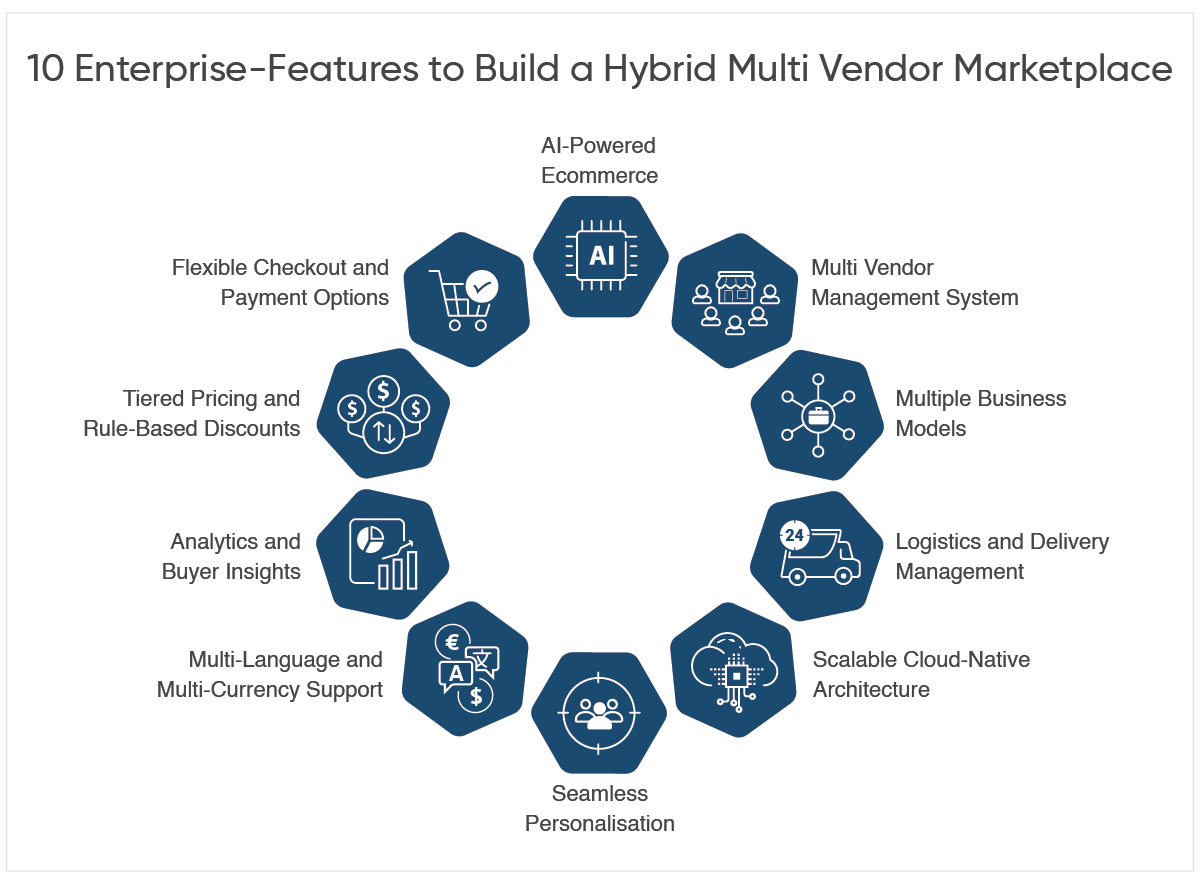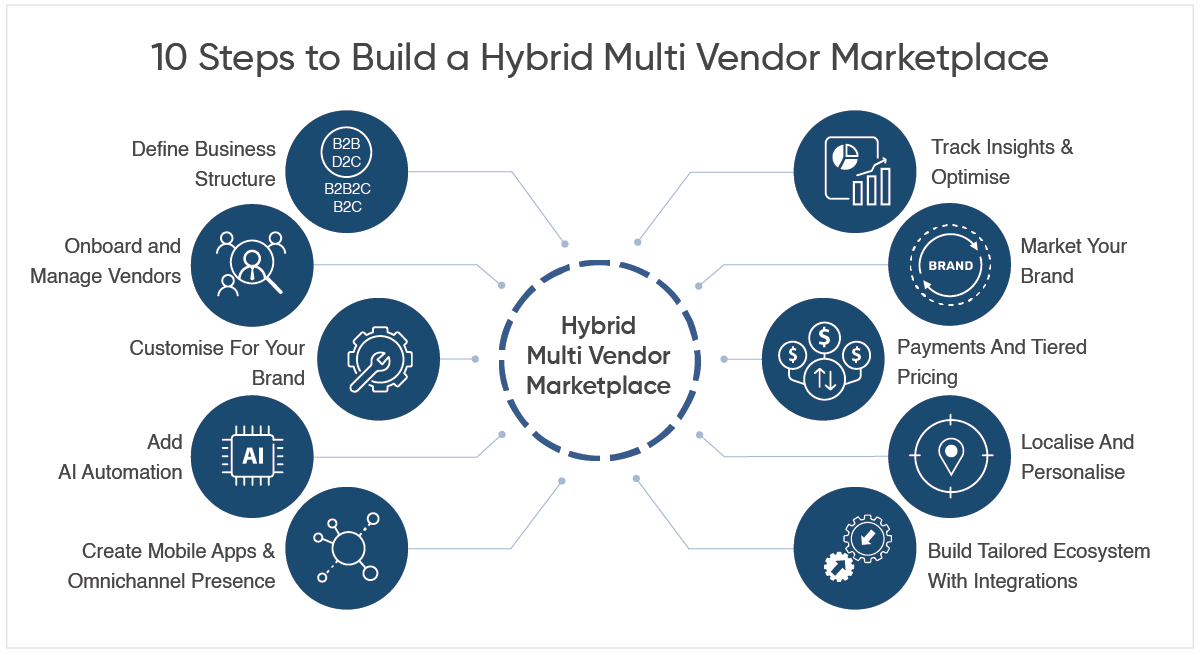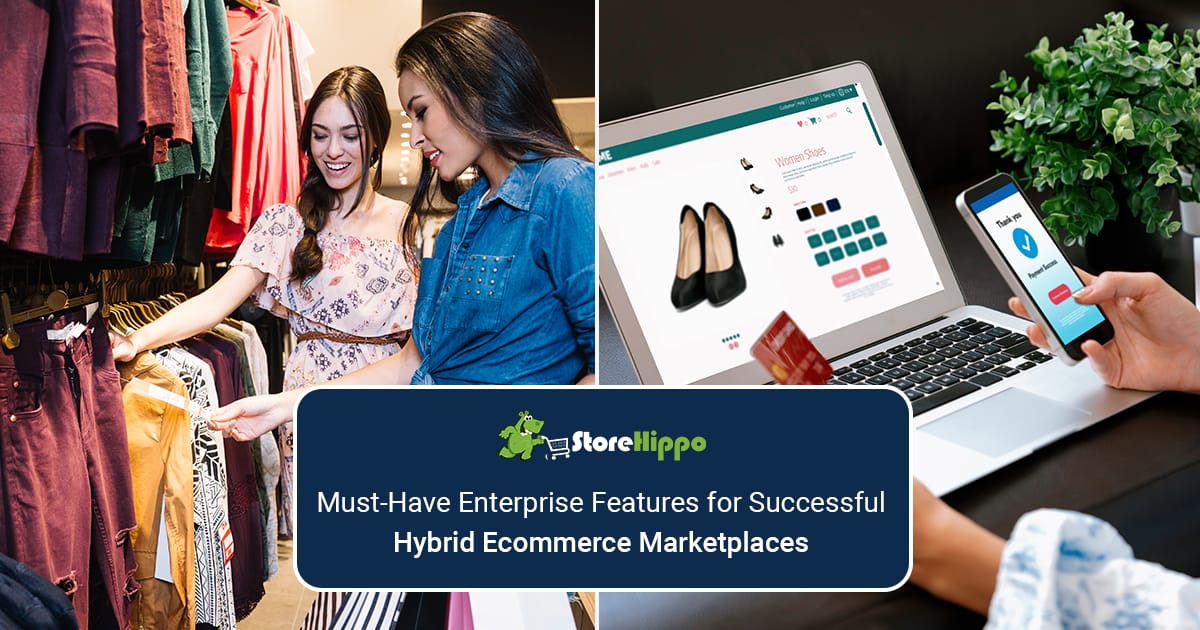Is your ecommerce business truly built for today’s dynamic market needs?
In a world where customers expect convenience, personalisation, and speed, across both B2B and B2C channels, it’s no longer enough to cater to just one side of the ecommerce spectrum.
Modern brands are embracing hybrid e commerce models that blend the best of both worlds, offering enterprise-level flexibility and scale.
But here’s the real challenge: can your platform support both B2B and B2C operations seamlessly?
Managing different pricing structures, customer journeys, order workflows, and vendor types under one umbrella can be overwhelming without the right enterprise marketplace builder.
That’s where building a hybrid multi vendor marketplace with powerful enterprise features becomes the game-changer.
So, what features should your platform have to unlock this hybrid advantage?
Let's find out.
Table of Contents
- Why Enterprises Should Build A Hybrid Multi Vendor Marketplace in 2026
- 10 Non-Negotiable Enterprise Features to Build a Hybrid E Commerce Multi Vendor Marketplace
- 1. Comprehensive Multi Vendor Management System
- 2. Support for Multiple Business Models
- 3. AI-Powered Ecommerce
- 4. Scalable Cloud-Native Architecture
- 5. Seamless Personalisation
- 6. Multi-Language and Multi-Currency Support
- 7. Comprehensive Analytics and Buyer Insights
- 8. Tiered Pricing and Rule-Based Discounts
- 9. Flexible Checkout and Payment Options
- 10. Integrated Logistics and Delivery Management
- How To Build A Hybrid Multi Vendor Marketplace With StoreHippo for 2026 and Beyond
- 1. Define Your Hybrid Business Structure
- 2. Onboard and Manage Vendors Efficiently
- 3. Customise For Your Enterprise Brand
- 4. Create Mobile Apps And Build Omnichannel Presence
- 5. Add An Edge With AI Automation
- 6. Build a Tailored Ecosystem With Integrations
- 7. Localise And Personalise At Scale
- 8. Implement Flexible Payments And Tiered Pricing
- 9. Market Your Brand For Better Reach
- 10. Track Insights And Optimise Continuously
- Conclusion
- FAQ
Why Enterprises Should Build A Hybrid Multi Vendor Marketplace in 2026
As customer expectations evolve and business models blur, hybrid e commerce is emerging as a must-have strategy for modern enterprises. It allows brands to operate B2B, B2C, D2C, and even hyperlocal channels under one unified platform, offering unmatched flexibility and reach.
With buyers demanding seamless, personalised experiences across every touchpoint, businesses can no longer rely on siloed setups. Hybrid e commerce empowers companies to adapt quickly, launch new channels effortlessly, and manage everything from a single dashboard.
It's not just a trend, it's the future of scalable, customer-centric digital commerce. Let’s look at the top consumer trends that drive hybrid ecommerce:

- 73% of retail shoppers are omnichannel shoppers
- 83% of shoppers research online before going to a physical store
- 87% of shoppers start their shopping in online stores
- 74% of shoppers rely on social networks for their purchasing decisions
- 27% of shoppers listed hybrid commerce as their preferred method
Source: BCG, Think with Google
The retail journey today rarely follows a straight path. Shoppers jump between one online touchpoint to another, researching products on social media, checking reviews on one ecommerce site, and then completing the purchase on mobile apps. This omnichannel behaviour isn’t just a trend; it’s the new normal. Shoppers expect a fluid, connected experience wherever they choose to interact with a brand. Hybrid multi vendor marketplaces that deliver on this seamless journey win more than just conversions; they build credibility, trust, and long-term loyalty.
10 Non-Negotiable Enterprise Features to Build a Hybrid E Commerce Multi Vendor Marketplace
In this blog, we break down 10 must-have enterprise features that empower you to build, run, and scale a hybrid multi vendor marketplace tailored for the complex demands of B2B and B2C modern commerce.

1. Comprehensive Multi Vendor Management System
A hybrid setup demands flexibility in managing vendors who cater to both B2B and B2C segments. For instance, wholesalers may need tools to manage bulk pricing and minimum order quantities, while B2C sellers need real-time inventory updates and faster delivery coordination. With a comprehensive vendor management system, brands can ensure smooth seller onboarding, order tracking, and managing operations efficiently, supporting both wholesale and retail sales models. This is crucial for enterprises looking to build a hybrid multi vendor marketplace without compromising operational control or customer experience.
StoreHippo comes with a comprehensive and easy-to-use vendor management solution that offers a quick and easy vendor registration process. You can seamlessly onboard multiple vendors from various geographies and industries. StoreHippo creates a unique vendor account for each seller to help them manage their everyday business. With StoreHippo, the admin can seamlessly manage the vendors, overview their business, approve or reject their products, etc right from the admin dashboard. StoreHippo also offers an adaptive payment feature that helps you divide a single payment made by a customer into multiple sellers as well as admin.
2. Support for Multiple Business Models
In a hybrid e commerce marketplace, managing multiple buyer types, corporate buyers and retail consumers, requires differentiated experiences. While the B2B buyers often need bulk ordering, reordering workflows, and credit terms, the B2C shoppers, on the other hand expect fast checkouts, promotions, and personalised journeys. Supporting multiple business models from one platform requires multi-store ecommerce solutions that enable different storefronts, pricing, content, and workflows tailored to each audience segment, without duplicating backend operations.
The fully hosted and managed enterprise ecommerce platform, StoreHippo comes with inbuilt support for diverse business models. It also comes with battle-tested solutions to help you build your marketplace in record time. With StoreHippo enterprise marketplace builder, you can quickly roll out multiple stores for different locations, create unique URLs for each location, create different inventory, offer unique deals etc, making it easier for customers to navigate and shop from their respective locations. StoreHippo’s multi-store solutions not only help you build, but also manage multiple location-based storefronts from a central admin dashboard. You can also create different mobile apps for each of the sub-stores right from your admin panel, without additional coding or cost.
3. AI-Powered Ecommerce
Managing a hybrid setup means balancing vast, structured B2B catalogs along with handling frequently changing B2C listings. Manually updating product content, images, tags, etc becomes a bottleneck, especially when a hybrid multi vendor marketplace is dealing with both B2B and B2C audience segments. AI-driven ecommerce helps automate these processes, right from catalog creation and updates to offering personalised product suggestions and advanced search. This not only saves time but ensures accurate, consistent, and SEO-friendly content. For businesses running both B2B and B2C segments, leveraging AI can drastically reduce operational overhead costs while enhancing user experience across the hybrid multi vendor marketplace.
You can harness the power of AI to create personalised shopping experiences and target customers as per their buying preferences with StoreHippo enterprise marketplace builder. With built-in AI tools StoreHippo enables enterprises to automate, personalise, and scale effortlessly. With features like AI-powered semantic search, personalised product recommendations, and intelligent shopping assistants like Mystore Genie, you can transform the entire buying journey. You can also simplify the backend operations through automated product catalogue generation, improve image quality with built-in tool Magic edit to boost engagement and conversions. This AI approach allows enterprises to build a marketplace that evolves with buyer behavior and market trends. Whether you're looking to innovate faster or improve conversions, StoreHippo's AI for ecommerce solutions deliver smarter commerce at every step.
4. Scalable Cloud-Native Architecture
Hybrid e commerce marketplaces must be ready for the unpredictable, be it bulk B2B orders or a sudden surge in B2C traffic during a festive sale. These diverse demands require a scalable backend solution that auto-scales and stays stable under load. Site speed plays a significant role in your multi vendor marketplace performance and user experience. Slow-loading pages lead to high bounce rates and lost sales opportunities. Optimising your site’s speed is more than just a technical requirement, it’s a cornerstone of user experience that directly affects your bottom line. For hybrid marketplaces, this level of scalability and resilience is essential to maintain smooth operations and deliver a seamless experience for all buyer types.
StoreHippo hybrid multi vendor marketplace builder comes with a secure and inherently scalable cloud-native infrastructure. Built on the most advanced technology stack, StoreHippo offers peak load tolerance with 99% uptime. StoreHippo supports the growth of your business so that you do not have to worry about the platform accommodating your business growth. The elastic scalability of the cloud-native infrastructure along with the auto-provisioning of servers ensures that your hybrid enterprise brands need not worry about peak load tolerance or growing exponentially. StoreHippo offers unmatched flexibility, inherent scalability, and superfast performance on your marketplace.
5. Seamless Personalisation
Personalisation plays a crucial role in winning customer loyalty, especially in a hybrid e commerce environment. B2B buyers look for relevant suggestions based on their procurement cycles, while B2C shoppers respond to emotional triggers like trending products or curated recommendations. Delivering this level of personalisation at a large scale, across web, mobile, and other channels, requires a dynamic, data-driven approach. Personalised shopping journeys, buyer-specific pricing, and context-aware search experiences help increase engagement and conversions. For any hybrid marketplace, personalisation isn’t just a nice-to-have thing anymore, it’s a necessity for catering to distinct buyer journeys effectively.
StoreHippo comes with multiple in-built marketing tools to help you create a personalised buyer journey for your hybrid multi vendor marketplace. With the powerful discount engine, you can set up multi-level discounts based on the product, vendors, brands, or your customer’s order value, location, etc. You can also offer personalised product recommendations based on your user’s order history and other demographics. StoreHippo helps you personalise your web, push, or mobile notifications about the latest arrivals, discounts, etc, based on your customers’ preferences. You can also integrate with AI tools to create an even more personalised shopping experience for your customers with StoreHippo’s seamless integrations.
6. Multi-Language and Multi-Currency Support
Expanding to new markets in a hybrid e commerce model comprising B2B and B2C audience segments means catering to buyers across geographies, cultures, and transaction norms. B2B clients may require region-specific catalogs and payment terms, while B2C shoppers expect their local language and currency to be supported by default. Lack of localisation can lead to buyer friction and lost sales. Supporting multiple languages and currencies ensures every buyer, regardless of location, gets a comfortable, familiar shopping experience. For a hybrid business aiming to serve both global and hyperlocal audiences, such localisation capabilities become non-negotiable.
StoreHippo ecommerce solutions help you build a hybrid multi vendor marketplace with its built-in multi language and multi currency support. You can create a seamless shopping experience for your customers across borders. StoreHippo offers 100+ languages (including right-to-left languages like Arabic and Hebrew) to help global customers shop in their native language. With multiple domestic and international payment gateways from StoreHippo customers can also seamlessly pay in the currency of their own choice from anywhere in the world. StoreHippo helps foray in the global markets with a host of features like multi currency invoicing, a built-in tax engine, international shipping partners, location-based pricing, etc.
7. Comprehensive Analytics and Buyer Insights
Running a hybrid e commerce business demands deep insights into how buyers behave, how vendors perform, and what products sell best across different segments. B2B buyers might have longer sales cycles and larger cart values, while B2C trends could shift weekly. Without detailed analytics, enterprises struggle to make data-backed decisions. Real-time dashboards and segment-specific reports empower businesses to tweak strategies quickly, forecast demand, and identify operational gaps. In a hybrid marketplace, comprehensive insights across B2B and B2C segments are key to driving profitability and long-term growth. You therefore not only need B2B ecommerce solutions but a hybrid solution that offers rich buyer insights.
StoreHippo comes with a gamut of analytical solutions to help you analyse your customer segmentation and make data-centric marketing plans for overall business growth. Built on a decoupled headless API, StoreHippo helps create personalised landing pages and custom forms using the built-in form builder and helps capture rich customer data. With StoreHippo solutions, you can seamlessly integrate with several data tools like Google Analytics, Zoho, etc. that provide rich customer data. StoreHippo also offers a gamut of marketing tools like email, push notifications, SEO tools, data analytics, etc help hybrid multi vendor marketplace brands drive sales.
8. Tiered Pricing and Rule-Based Discounts
A hybrid business model needs flexible pricing to serve a broad customer base. B2B clients often expect bulk discounts, special pricing tiers, or contract rates, while B2C buyers look for time-sensitive deals and coupons. Manually handling these price variations can become chaotic and error-prone. That’s where rule-based pricing engines come in, helping you automate discount logic based on various factors. For a hybrid marketplace, this ability to dynamically apply pricing rules ensures consistency, improves buyer satisfaction, and boosts conversion rates across all segments.
With the inbuilt tiered pricing from StoreHippo B2B ecommerce solutions, you can quickly implement and manage multi-pricing on your marketplace. You can quickly set up multi-level prices like volume-based pricing, rule-based prices, min-max quantity-based pricing, customer segment or customer-specific pricing to attract B2B buyers from various segments. The powerful discount engine helps you implement multi-level discounts on your marketplace, like order-based, volume-based, brand-based, etc.
9. Flexible Checkout and Payment Options
One of the biggest challenges in hybrid ecommerce is accommodating different buyer expectations at checkout. B2C customers expect fast, frictionless payments via cards, wallets, or buy-now-pay-later options. On the other hand, B2B buyers require more structured options, like invoicing, credit terms, or PO-based payments. A rigid payment process can lead to high cart abandonment. When you offer flexible, buyer-specific checkout workflows, you improve satisfaction and ensure smooth transactions. A hybrid multi vendor marketplace needs an adaptable checkout process that caters to both business buyers and retail consumers without compromising on security or compliance.
StoreHippo ecommerce solutions come with 60+ pre-integrated domestic and international payment gateways to help your customers choose their preferred payment option. You can seamlessly integrate with multiple payment options like UPI, digital wallets, net banking, store credits, etc, to create a frictionless payment process on your marketplace. You can also offer personalised payment gateways based on your customers' location on your marketplace. StoreHippo also supports transactions in multiple currencies for your global customers.
10. Integrated Logistics and Delivery Management
Fulfilling orders in a hybrid e commerce model can be logistically complex. B2B transactions often involve large, scheduled shipments, whereas B2C deliveries prioritise speed and convenience. Managing both models under one roof requires integrated logistics tools, real-time tracking, and multiple carrier options. Without this, businesses risk delays, miscommunication, and dissatisfied customers. In a hybrid marketplace, integrating with smart logistics management helps streamline shipping operations, reduce costs, and maintain service quality for both bulk and hyperlocal deliveries.
StoreHippo ecommerce solution helps automate the shipping and logistics process to import bulk orders, update order status, assign delivery partners, customize the shipping rates, etc seamlessly. With StoreHippo, you can centrally manage all your orders from different platforms and align them for deliveries effortlessly with the order management system. StoreHippo comes with 30+ logistic partners to streamline your shipping solutions. You can also integrate with the shipping solution of your choice to offer a quick and seamless delivery to your B2B buyers. With the built-in delivery boy management system from StoreHippo, you can also handle your fleet of delivery boys to create a streamlined supply chain and ensure timely deliveries of both bulk and retail orders.
How To Build A Hybrid Multi Vendor Marketplace With StoreHippo for 2026 and Beyond
Building a hybrid eCommerce marketplace today isn’t just a smart move, it’s a survival strategy for enterprises balancing both B2B and B2C demands. By 2026, wholesale brands can unlock exponential growth by expanding into retail and using their rich data intelligence to personalise experiences, optimise pricing, and capture new buyer

Here’s how you can build a hybrid multi vendor marketplace with StoreHippo, the enterprise builder designed for the next era of digital commerce.
1. Define Your Hybrid Business Structure
- Map your B2B and B2C operations along pointers like pricing, buyer journeys, and vendor roles along with targeted markets.
- Leverage StoreHippo’s multi-store architecture to build dedicated storefronts for each model or region managed by a common central admin.
2. Onboard and Manage Vendors Efficiently
- Simplify vendor registration, automate catalogue setup using AI tools, and create your central, catch-all master catalogue.
- Enable vendors to manage business independently with separate admin dashboards and seller pages on your hybrid e commerce marketplace.
- Use the built-in vendor management system to manage vendors, their payouts, performance, commissions etc.
3. Customise For Your Enterprise Brand
- Tailor your marketplace’s design, workflows, and storefronts to your brand identity using StoreHippo B2B solutions built in customisations and design tools.
- With StoreHippo’s headless, low-code platform, you can customise every layer without plugins or complex coding and deliver a consistent brand experience across every buyer segment.
4. Create Mobile Apps And Build Omnichannel Presence
- Build Android and iOS apps using the no-code mobile app builder from your StoreHippo admin.
- Build omnichannel presence through PWA stores, mobile apps, social platform connectivity or develop your niche AI shopping assistant.
5. Add An Edge With AI Automation
- Leverage powerful built-in AI tools to build or update massive catalogues through product images and refine images with Magic Edit to boost engagement.
- Sell more with AI powered semantic search, recommendations and conversational niche AI agent that works in text and voice mode.
6. Build a Tailored Ecosystem With Integrations
- Use API-based integrations to connect your hybrid multi vendor marketplace with ERP, CRM, CMS, DMS, and other enterprise systems of your choice.
- Integrates seamlessly with logistics, payments, and marketing tools to streamline operations and growth.
7. Localise And Personalise At Scale
- Customise pricing, discounts, and communication for both B2B and B2C buyers.
- Implement RFQ, MOQ, rule-based pricing, custom offers and loyalty programs to engage buyers better.
- Explore global markets with multi-language and multi-currency support, offering local pricing, invoices, and taxes for every region.
8. Implement Flexible Payments And Tiered Pricing
- Choose from 60+ pre-integrated payment gateways to offer flexible payment options for faster conversions.
- Set up tiered pricing, volume discounts, and customer-specific rates automatically.
9. Market Your Brand For Better Reach
- Boost visibility with StoreHippo enterprise marketplace builder’s built-in marketing tools, blog engine, SEO tools, discount coupons etc.
- Recover lost sales using abandoned cart follow-ups and real-time reports.
- Integrate Google Analytics and track performance using built-in reports and analytics data.
10. Track Insights And Optimise Continuously
- Make smarter decisions with data-driven insights from customer data and buying trends, along with reports and Google Analytics.
- Strategize growth plans with data-driven insights and extensive features and tools offered by StoreHippo.
With StoreHippo’s enterprise marketplace builder, you can combine B2B and B2C operations, mobile apps, AI automation, and omnichannel capabilities to create a future-ready hybrid eCommerce marketplace built for 2026 and beyond.
Conclusion
Building a hybrid multi vendor marketplace isn’t just about combining B2B and B2C channels under one roof, it’s about creating a dynamic, scalable, and personalised ecosystem that adapts to the needs of every buyer and seller. The hybrid approach empowers brands to serve diverse markets, respond to evolving buying patterns, and offer truly differentiated experiences at scale.
With StoreHippo enterprise marketplace builder, you can go beyond traditional business models and tap into new growth opportunities. StoreHippo’s advanced B2B ecommerce solutions, when combined with hybrid commerce capabilities, provide the agility, intelligence, and control needed to manage complex operations effortlessly. Built on MACH architecture, StoreHippo gives inherent flexibility and scalability to build tailor-made solutions for the unique needs of your business.
Ready to build a hybrid e commerce multi vendor marketplace with StoreHippo? Check out the 300+ built-in enterprise-grade features by booking your free demo now.
FAQ
1. What is a hybrid e commerce marketplace and how does it differ from traditional models?
A hybrid e commerce marketplace blends B2B and B2C operations on a single digital platform. Unlike traditional ecommerce setups that serve only one type of buyer, a hybrid model lets enterprises run both bulk and retail sales together, giving brands flexibility, wider reach, and better buyer insights. It allows brands to streamline inventory, pricing, and fulfillment across channels while maintaining unique experiences for each buyer segment.
StoreHippo’s enterprise marketplace builder enables brands to create a truly hybrid multi vendor marketplace. With built-in multi-store feature that creates distinct buyer experiences for B2B and B2c buyers through store design, differentiated pricing, and custom workflows. Enterprises can easily manage wholesale and retail operations from one common admin without using multiple plugins or platforms.
2. Why should B2B enterprise brands opt for a hybrid multi vendor marketplace model?
B2B enterprises are shifting to the hybrid multi vendor marketplace model to serve both wholesale and retail buyers through one unified platform. By blending B2B eCommerce solutions with B2C agility, brands can expand faster, manage inventory efficiently, and boost ROI across channels.
With StoreHippo’s hybrid eCommerce framework, enterprises get built-in multi vendor management, AI automation, and multi-store flexibility to scale seamlessly. From handling thousands of sellers to enabling region-based pricing, StoreHippo empowers brands to grow smarter, faster, and without silos.
3. Why an AI powered enterprise marketplace builder essential for modern hybrid brands?
An AI-powered enterprise marketplace builder is essential for modern hybrid e commerce brands because it brings speed, intelligence, and precision to every layer of operations. From simplifying catalogue management to personalising recommendations, and delivering context-aware search results for both B2B and B2C buyers, AI helps in everything, boosting engagement and conversions.
With StoreHippo’s AI-powered enterprise marketplace builder, hybrid brands can automate time-consuming and error-prone tasks like catalogue updates, optimise workflows, and personalise buyer journeys in real time. Features like semantic search, Magic Edit for image enhancement, smart product tagging, and AI shopping assistants make every interaction faster, smarter, and attuned to better conversions, helping enterprises scale efficiently across diverse business models.
4. What are the realistic cost and timeline to launch a hybrid multi vendor marketplace to market?
A ground-up hybrid multi vendor marketplace typically takes 10-18 months and costs between $100,000–$300,000+, depending on complexity, integrations, and scalability requirements. Ongoing plugin updates and maintenance can add another $2,000-$5,000 per month. Managing B2B and B2C layers, AI tools, and vendor operations separately adds both time and complexity.
With StoreHippo’s no-plugin, low-code enterprise marketplace builder, most brands launch in a few weeks and at a fraction of the cost, with AI, multi-vendor, payments, and logistics built in. StoreHippo cuts down on development time, integration costs, and long-term maintenance efforts.
5. How easy is it to add a new model like hyperlocal B2C to a hybrid eCommerce marketplace?
For most platforms, adding a new model such as hyperlocal B2C means complex integrations, extra plugins, and long development cycles. But with StoreHippo’s hybrid e commerce platform, it’s quick and effortless.
StoreHippo comes with built-in multi-model support and a composable architecture that lets enterprises add or switch between B2B, B2C, D2C, or dealer-powered hyperlocal e commerce models without reworking the backend. Using buit-in features for location-based stores, hyperlocal route for logistics with maps, vendor and delivery boy management features, brands can roll out new business models in days instead of months, all from StoreHippo platform and a common central control.


